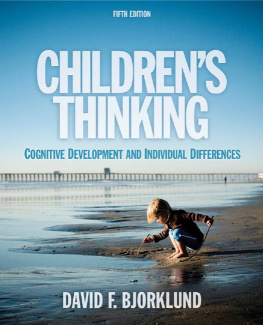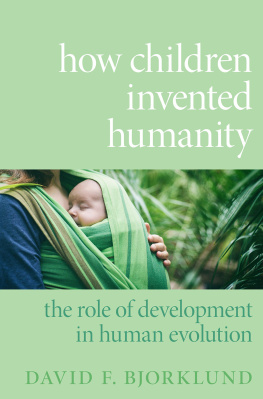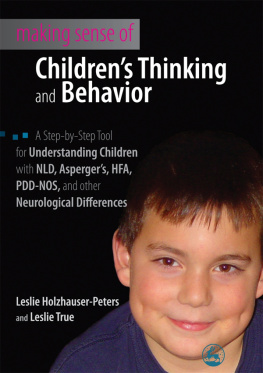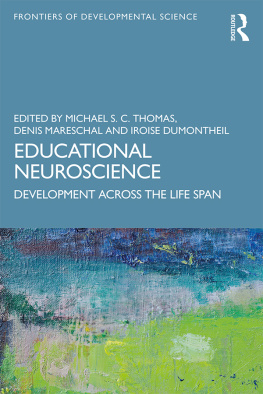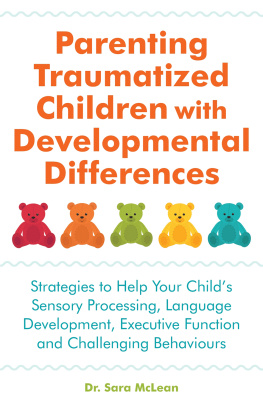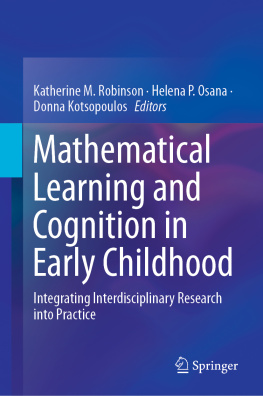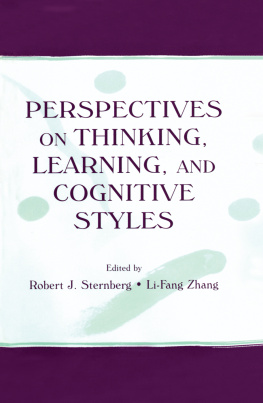David F. Bjorklund - Childrens Thinking
Here you can read online David F. Bjorklund - Childrens Thinking full text of the book (entire story) in english for free. Download pdf and epub, get meaning, cover and reviews about this ebook. year: 2011, publisher: Cengage Learning, genre: Children. Description of the work, (preface) as well as reviews are available. Best literature library LitArk.com created for fans of good reading and offers a wide selection of genres:
Romance novel
Science fiction
Adventure
Detective
Science
History
Home and family
Prose
Art
Politics
Computer
Non-fiction
Religion
Business
Children
Humor
Choose a favorite category and find really read worthwhile books. Enjoy immersion in the world of imagination, feel the emotions of the characters or learn something new for yourself, make an fascinating discovery.
- Book:Childrens Thinking
- Author:
- Publisher:Cengage Learning
- Genre:
- Year:2011
- Rating:5 / 5
- Favourites:Add to favourites
- Your mark:
- 100
- 1
- 2
- 3
- 4
- 5
Childrens Thinking: summary, description and annotation
We offer to read an annotation, description, summary or preface (depends on what the author of the book "Childrens Thinking" wrote himself). If you haven't found the necessary information about the book — write in the comments, we will try to find it.
Childrens Thinking — read online for free the complete book (whole text) full work
Below is the text of the book, divided by pages. System saving the place of the last page read, allows you to conveniently read the book "Childrens Thinking" online for free, without having to search again every time where you left off. Put a bookmark, and you can go to the page where you finished reading at any time.
Font size:
Interval:
Bookmark:
 F I F T H E D I T I O N Childrens Thinking Cognitive Development and Individual Differences David F. Bjorklund Florida Atlantic University Australia Brazil Japan Korea Mexico Singapore Spain United Kingdom United States This is an electronic version of the print textbook. Due to electronic rights restrictions, some third party content may be suppressed. Editorial review has deemed that any suppressed content does not materially affect the overall learning experience. The publisher reserves the right to remove content from this title at any time if subsequent rights restrictions require it. For valuable information on pricing, previous editions, changes to current editions, and alternate formats, please visit www.cengage.com/highered to search by ISBN#, author, title, or keyword for materials in your areas of interest.
F I F T H E D I T I O N Childrens Thinking Cognitive Development and Individual Differences David F. Bjorklund Florida Atlantic University Australia Brazil Japan Korea Mexico Singapore Spain United Kingdom United States This is an electronic version of the print textbook. Due to electronic rights restrictions, some third party content may be suppressed. Editorial review has deemed that any suppressed content does not materially affect the overall learning experience. The publisher reserves the right to remove content from this title at any time if subsequent rights restrictions require it. For valuable information on pricing, previous editions, changes to current editions, and alternate formats, please visit www.cengage.com/highered to search by ISBN#, author, title, or keyword for materials in your areas of interest.
Childrens Thinking: Cognitive Development 2012, 2005 Wadsworth, Cengage Learning and Individual Differences, Fifth Edition ALL RIGHTS RESERVED. No part of this work covered by the copyright David F. Bjorklund herein may be reproduced, transmitted, stored, or used in any form or by any Acquisitions Editor: Jaime Perkins means graphic, electronic, or mechanical, including but not limited to photocopying, recording, scanning, digitizing, taping, Web distribution, Associate Development Editor: Nic Albert information networks, or information storage and retrieval systems, except Assistant Editor: Philip Hovanessian as permitted under Section 107 or 108 of the 1976 United States Copyright Editorial Assistant: Jessica Alderman Act, without the prior written permission of the publisher. Marketing Manager: Jessica Egbert For product information and technology assistance, contact us at Executive Marketing Communications Cengage Learning Customer & Sales Support, 1-800-354-9706 Manager: Talia Wise For permission to use material from this text or product, Art Director: Vernon Boes submit all requests online at www.cengage.com/permissions Manufacturing Director: Marcia Locke Further permissions questions can be emailed to permissionrequest@cengage.com Manufacturing Buyer: Betsy Donaghey Rights Acquisition Director: Bob Kauser Library of Congress Control Number: 2010939528 Rights Acquisition Specialist, Text: Roberta Broyer ISBN-13: 978-1-111-34605-8 Rights Acquisition Specialist, Image: Roberta ISBN-10: 1-111-34605-4 Broyer Content Project Management: Wadsworth PreMediaGlobal 20 Davis Drive Production Service: PreMediaGlobal Belmont, CA 94002 USA Cover Designer: Andy Norris Cover Image: Aurora Open/Myles McGuinness/ Getty Images Cengage Learning is a leading provider of customized learning solutions with office locations around the globe, including Singapore, the United Production House/Compositor: Kingdom, Australia, Mexico, Brazil and Japan. Locate your local office at PreMediaGlobal international.cengage.com/region Cengage Learning products are represented in Canada by Nelson Education, Ltd. For your course and learning solutions, visit www.cengage.com.
Purchase any of our products at your local college store or at our preferred online store www.cengagebrain.com. Instructors: Please visit login.cengage.com and log in to access instructor-specific resources. Printed in the United States of America 1 2 3 4 5 6 7 14 13 12 11 10 B R I E F C O N T E N T S PREFACE xiii Chapter 1 An Introduction to Cognitive Development 1 Chapter 2 Biological Bases of Cognitive Development 31 Chapter 3 The Social Construction of Mind: Sociocultural Perspectives on Cognitive Development Chapter 4 Infant Perception and Cognition 100 Chapter 5 Thinking in Symbols: The Development of Representation 154 Chapter 6 The Development of Folk Knowledge 196 Chapter 7 Learning to Think on Their Own: Executive Function, Strategies, and Problem Solving Chapter 8 Memory Development 301 Chapter 9 Language Development 348 Chapter 10 Social Cognition 398 Chapter 11 Schooling and Cognition 442 Chapter 12 Approaches to the Study of Intelligence 492 Chapter 13 Origins, Modification, and Stability of Intellectual Differences 530 iii iv Brief Contents GLOSSARY REFERENCES CREDITS AUTHOR INDEX SUBJECT INDEX C O N T E N T S PREFACE xiii Chapter 1 An Introduction to Cognitive Development 1 Basic Concepts in Cognitive Development Cognition Development Developmental Function and Individual Differences Five Truths of Cognitive Development 7 Cognitive Development Proceeds as a Result of the Dynamic and Reciprocal Transaction of Internal and External Factors Cognitive Development Is Constructed Within a Social Context Cognitive Development Involves Both Stability and Plasticity over Time Box 1-1: The Adaptive Nature of Cognitive Immaturity Cognitive Development Involves Changes in the Way Information Is Represented Children Develop Increasing Intentional Control over Their Behavior and Cognition Cognitive Development Involves Changes in Both Domain-General and Domain-Specific Abilities Goals of Cognitive Developmentalists Summary Key Terms and Concepts Suggested Readings Chapter 2 Biological Bases of Cognitive Development 31 Evolution and Cognitive Development Evolutionary Theory Evolutionary Developmental Psychology Models of Gene-Environment Interaction The Developmental Systems Approach The Genotype ! Environment Theory 47 The Development of the Brain Box 2-1: The Evolution of the Human Brain Neuronal Development How Do Young Brains Get Hooked Up? The Development of the Neocortex The Brains Plasticity 65 v vi Contents Developmental Biology and Cognitive Development Summary Key Terms and Concepts Suggested Readings Chapter 3 The Social Construction of Mind: Sociocultural Perspectives on Cognitive Development 74 The Role of Culture in Cognitive Development Tools of Intellectual Adaptation The Social Origins of Early Cognitive Competencies The Zone of Proximal Development Apprenticeship in Thinking and Guided Participation Sociohistorical Influences Assessing Cognitive Development from a Sociocultural Perspective Implications for Education Sociocultural Theory and Cognitive Development Summary Key Terms and Concepts Suggested Readings Chapter 4 Infant Perception and Cognition 100 Basic Perceptual Abilities of Young Infants Some Methodologies Used to Assess Infant Perception This Sucks: Using Infant Sucking to Provide Insight into Infant Perception Visual Preference Paradigm Habituation/Dishabituation Paradigm The Development of Visual Perception Vision in the Newborn The Development of Visual Preferences The Development of Face Processing Auditory Development Box 4-1: The Development of Infants Specialization for Processing Faces Speech Perception Music Perception Combining Senses Intermodal Integration Intermodal Matching The Intersensory Redundancy Hypothesis How Do We Know What Babies Know? The Violation-of-Expectation Method Contents vii Core Knowledge Object Representation Early Number Concepts Arguments Against Core Knowledge Category Representation How Is Categorization Measured? The Structure of Infants Categories 148 What Is Infant Cognition Made Of? Summary Key Terms and Concepts Suggested Readings Chapter 5 Thinking in Symbols: The Development of Representation 154 Learning to Use Symbols Young Childrens Interpretation of Pictures and Models 156 The Appearance/Reality Distinction Piagets Theory 160 Some Assumptions of Piagets Theory 161 Stages of Development Box 5-1: Culture and Symbolic Development The State of Piagets Theory Today 181 Everyday Expressions of the Symbolic Function Symbolic Play Distinguishing Between Fantasy and Reality Fuzzy-Trace Theory Assumptions of Fuzzy-Trace Theory Developmental Differences The Symbolic Species Summary Key Terms and Concepts Suggested Readings Chapter 6 The Development of Folk Knowledge 196 Theory Theories of Cognitive Development Folk Psychology: Developing a Theory of Mind Basic Social-Cognitive Skills Underlying Theory of Mind The Development of Mind Reading Box 6-1: Do False-Belief Tasks Overestimate Childrens Theory of Mind? Solving True-Belief Tasks Theory of Mind, Evolved Modules, and Autism Extending Theory of Mind Some Final Reflections on Theory of Mind viii Contents Box 6-2: Do Chimpanzees Have a Theory of Mind? Folk Biology: Understanding the Biological World Is It Alive? What Young Children Know and Dont Know about Biology 222 Where Do Babies Come From? Folk Physics: Understanding the Physical World The Development of Spatial Cognition Object-Oriented Play and Tool Use The Relationship between Tool Use and Object-Oriented Play Childrens Understanding of Time 241 Some Final Reflections on Childrens Understanding of the Physical World Summary Key Terms and Concepts Suggested Readings Chapter 7 Learning to Think on Their Own: Executive Function, Strategies, and Problem Solving 248 Assumptions of Information-Processing Approaches The Development of Basic-Level Processes: Executive Function Speed of Processing Memory Span and Working Memory Attention Learning How Not to Respond: Inhibition and Resistance to Interference Cognitive Flexibility Some Final Thoughts on Executive Function The Development of Strategies Increases in Strategy Use, Improvements in Performance Box 7-1: Executive Functioning and Brain Development Utilization Deficiencies How Do Childrens Strategies Develop? Sieglers Adaptive Strategy Choice Model The Development of Memory Strategies Factors that Influence Childrens Strategy Use and Effectiveness 275 Culture and Strategies Strategies in the Classroom Learning to Solve Problems The Development of Problem Solving Reasoning Summary Key Terms and Concepts Suggested Readings Contents ix Chapter 8 Memory Development 301 Representation of Knowledge Memory Development in Infancy Preference for Novelty as an Indication of Memory Kicking Up Their Heels Deferred Imitation as a Measure of Memory Neurological Basis of Infant Memory Infantile Amnesia Why Cant We Remember Events from Infancy and Early Childhood? Infantile Amnesia and Hypnotic Age Regression Implicit Memory The Development of Event Memory Script-Based Memory The Role of Parents in Teaching Children to Remember 323 Children as Eyewitnesses Age Differences in Childrens Eyewitness Memories 327 Age Differences in Suggestibility Some Final Thoughts on Children as Eyewitnesses Box 8-1: Assessing Childrens Memories in Real-Life Settings 340 Remembering to Remember Consistency and Stability of Memory Is Memory a Domain-General Faculty or a Set of Domain-Specific Abilities? How Stable Is Memory Performance over Time? Summary Key Terms and Concepts Suggested Readings Chapter 9 Language Development 348 Box 9-1: Is Language Unique to Humans? Can Apes Talk? 350 What Is Language? Describing Childrens Language Development 352 Phonological Development Morphological Development Syntactic Development Semantic Development Pragmatics Speech Registers: The Case of Black English Some Theoretical Perspectives of Language Development Nativist Perspectives on Language Development Box 9-2: The Less Is More Hypothesis 381 Social-Interactionist Perspectives of Language Development x Contents Bilingualism and Second-Language Learning Gender Differences in Language Acquisition Language and Thought Summary Key Terms and Concepts Suggested Readings Chapter 10 Social Cognition 398 Social Learning Forms of Social Learning Age Differences in Social Learning Social Learning in Chimpanzees Box 10-1: Mirror Neurons: The Foundation of Social Learning? Social Cognitive Theory Factors Involved in Observational Learning The Development of Self-Efficacy Social Information Processing The Development of a Concept of Self Cognitive Bases of Gender Identity Gender Constancy Gender Schemas Gender Knowledge and Sex-Typed Behavior: Possible Predispositions Childrens Theories of Gender 438 How Special Is Social Cognition? 439 Summary Key Terms and Concepts Suggested Readings Chapter 11 Schooling and Cognition 442 The Development of Reading Skills A Brief Overview of Learning to Read Emergent Literacy Cognitive Development and Reading How to Teach Children to Read Sex Differences in Reading and Verbal Abilities Childrens Number and Arithmetic Concepts 459 Conservation of Number Learning to Count Childrens Arithmetic Concepts 463 Math Disability Box 11-1: The (Math) Games Children Play Contents xi Cultural Differences in Mathematics Sex Differences in Mathematical Ability Schooling and Cognitive Development Schooling Versus Age Effects on Intelligence The Effect of Schooling on IQ The Costs and Benefits of Academic Preschools Evolutionary Educational Psychology Principles of Evolutionary Educational Psychology Physical Activity Summary Key Terms and Concepts Suggested Readings Chapter 12 Approaches to the Study of Intelligence 492 The Psychometric Approach to the Study of Intelligence Factors of Intelligence IQ Tests Information-Processing Approaches to the Study of Intelligence Basic-Level Processes Higher-Level Cognitive Abilities Sternbergs Triarchic Theory of Intelligence 514 The Contextual Subtheory, or Practical Intelligence The Experiential Subtheory, or Creative Intelligence The Componential Subtheory, or Analytic Intelligence Gardners Theory of Multiple Intelligences 519 Box 12-1: The Triarchic Theory Goes to School Criteria of an Intelligence Multiple Intelligences and Education Assessment of Gardners Theory 526 Summary Key Terms and Concepts Suggested Readings Chapter 13 Origins, Modification, and Stability of Intellectual Differences 530 A Transactional Approach to the Study of Intelligence Behavioral Genetics and the Heritability of Intelligence The Concept of Heritability Elementary Cognitive Tasks and Intelligence Familial Studies of Intelligence The Role of the Environment in Behavioral Genetics Analyses How Seriously Should We Take Heritability Studies of IQ? xii Contents Experience and Intelligence Establishing Intellectual Competence Modification and Maintenance of Intellectual Functioning How Modifiable Is Human Intelligence? The Stability of Intelligence Defining Stability Predicting Later Intelligence from Tests in Infancy The Stability of IQ Scores During Childhood Patterns of IQ Change During Childhood Box 13-1: Are People Getting Smarter? The Flynn Effect Summary Key Terms and Concepts Suggested Readings GLOSSARY REFERENCES CREDITS AUTHOR INDEX SUBJECT INDEX P R E F A C E Cognitive development continues to be a dynamic field. Theories and research findings from a variety of areas combine to produce a picture of a developing child who is born prepared to make some sense of the world, but whose mind is also shaped by forces in the physical and social environment. This theme, of the continuous transaction between an embodied child embedded in a social world, continues to serve as the focus of the fifth edition. In addition, themes prominent in the previous editions have even greater emphasis in the fifth, reflecting, I believe, how the science of cognitive development has changed over recent years.
Next pageFont size:
Interval:
Bookmark:
Similar books «Childrens Thinking»
Look at similar books to Childrens Thinking. We have selected literature similar in name and meaning in the hope of providing readers with more options to find new, interesting, not yet read works.
Discussion, reviews of the book Childrens Thinking and just readers' own opinions. Leave your comments, write what you think about the work, its meaning or the main characters. Specify what exactly you liked and what you didn't like, and why you think so.

